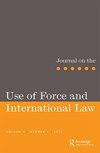英国核威慑政策:非法的武力威胁
Q3 Social Sciences
Journal on the Use of Force and International Law
Pub Date : 2019-07-03
DOI:10.1080/20531702.2019.1669323
引用次数: 4
摘要
摘要本文探讨了根据第2条第(4)款,威胁的非法性可能是由受威胁的武力在另一法律体系下是非法的多种方式造成的。它的结论是:(a)威慑是一种威胁;(b) 如果使用受威胁的武力是非法的,则威胁是非法的;(c) 使用核武器是非法的一般规则的唯一可能例外是极端自卫情况;(d) 在交战报复中使用核武器是非法的;因此(e)英国政策的两个具体方面是非法的:拒绝排除首次使用的可能性,以及低水平、高功率使用的可能性。考虑了追究英国责任的可能策略,国际法院核武器咨询意见第47-8段在附录中进行了剖析。尽管重点是英国,但分析和结论与其他国家有关。本文章由计算机程序翻译,如有差异,请以英文原文为准。
UK Nuclear deterrence policy: an unlawful threat of force
ABSTRACT This article explores multiple ways in which the unlawfulness of a threat, under Article 2(4), can result from the threatened force being unlawful under another body of law. It concludes: (a) deterrence is a threat; (b) a threat is unlawful if use of the threatened force would be unlawful; (c) the only possible exception to the general rule that use of nuclear weapons would be unlawful is an extreme circumstance of self-defence; (d) use of nuclear weapons in a belligerent reprisal would be unlawful; and so (e) two specific aspects of UK policy are unlawful: the refusal to rule out first use, and the possibility of low level, high power use. Possible strategies to hold the UK to account are considered, and paragraphs 47–8 of the ICJ's Nuclear Weapons advisory opinion are dissected in an appendix. Despite the UK focus, the analysis and conclusions are relevant to other states.
求助全文
通过发布文献求助,成功后即可免费获取论文全文。
去求助
来源期刊

Journal on the Use of Force and International Law
Social Sciences-Law
CiteScore
1.10
自引率
0.00%
发文量
13
 求助内容:
求助内容: 应助结果提醒方式:
应助结果提醒方式:


